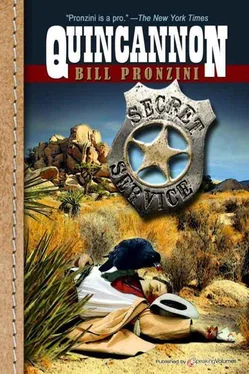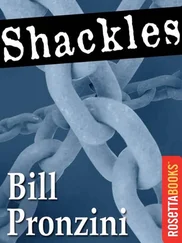Bill Pronzini - Quincannon
Здесь есть возможность читать онлайн «Bill Pronzini - Quincannon» весь текст электронной книги совершенно бесплатно (целиком полную версию без сокращений). В некоторых случаях можно слушать аудио, скачать через торрент в формате fb2 и присутствует краткое содержание. Жанр: Криминальный детектив, на английском языке. Описание произведения, (предисловие) а так же отзывы посетителей доступны на портале библиотеки ЛибКат.
- Название:Quincannon
- Автор:
- Жанр:
- Год:неизвестен
- ISBN:нет данных
- Рейтинг книги:5 / 5. Голосов: 1
-
Избранное:Добавить в избранное
- Отзывы:
-
Ваша оценка:
- 100
- 1
- 2
- 3
- 4
- 5
Quincannon: краткое содержание, описание и аннотация
Предлагаем к чтению аннотацию, описание, краткое содержание или предисловие (зависит от того, что написал сам автор книги «Quincannon»). Если вы не нашли необходимую информацию о книге — напишите в комментариях, мы постараемся отыскать её.
Quincannon — читать онлайн бесплатно полную книгу (весь текст) целиком
Ниже представлен текст книги, разбитый по страницам. Система сохранения места последней прочитанной страницы, позволяет с удобством читать онлайн бесплатно книгу «Quincannon», без необходимости каждый раз заново искать на чём Вы остановились. Поставьте закладку, и сможете в любой момент перейти на страницу, на которой закончили чтение.
Интервал:
Закладка:
Was all the one that fell.
Was it Goliath was too large,
Or only I too small?
He put the book aside, reached for the bottle to pour himself another drink. Poetry. Once he had loved it, just as his mother had; now there was too much meaning in most of it, too many reminders of what he had done and what he was.
He was glad his mother had not lived to hear about Katherine Bennett. She had died much too young, of a disease that had left her withered and riddled with pain. Not that pain had been a stranger to her. A gentlewoman, Margaret Cullen Quincannon, a product of the Virginia aristocracy who had fought on the wrong side during the Civil War and had never been able to reconcile their losses. Life had been good to her before the hostilities; she had married a handsome Scot from Washington, moved to the capital, had a son, sipped cordials and broken bread with heads of state. But then the war had come, and while her loyalties were with the South, her staunchly pro-Union husband had forced her to stay in Washington, in the midst of the Northern effort to crush the Confederacy. One of her brothers had been killed at Bull Run; her father had died of apoplexy shortly before Lee’s surrender at Appomattox Court House. The laughter and joy of her youth turned to sorrow and melancholy, to the pain that had stayed with her, growing, for the rest of her days.
She had died bewildered, had Margaret Cullen Quincannon. With nothing left to her but faded memories of a time of gentility that had become a time of blood — and her pride in her only son’s success as a detective, first with his father’s Washington agency, where he had begun work as a runner and office boy at the age of seventeen, and then with the Secret Service. If she had known about Katherine Bennett, it would have shaken that pride and caused her even more pain.
Thomas L. Quincannon would not have understood either, if he were still alive; if an assassin’s bullet had not cut him down on the Baltimore docks eleven months after the death of his wife. A stone-hard man, his father; stubborn, unyielding. A man of principle. The rival of Pinkerton, the better of Pinkerton to hear him tell it. And a damned old fool who had believed himself invincible, who should not have been on the Baltimore docks the night he was shot, who should have been home in bed like other stout and gout-ridden men his age.
“You shot a pregnant woman by accident,” he would have said to his son, “in the performance of your sworn duty to the government of your country. It was unavoidable. Unfortunate, of course, but nonetheless an accident. Put it behind you, John. Forget it. There is no purpose in remorse. What is done is done and cannot be undone.” No, Thomas Quincannon would not have understood at all.
Quincannon had taken his father’s profession, had worked with his father, had inherited his father’s ability for detective work. But inside, at the core of him, he was his mother’s son.
He awoke at dawn with a throbbing head and a queasy stomach: it had taken two more drinks to bring him the temporary oblivion of sleep. He took another now, to still the inner trembling, and then doused his head with water from the bureau pitcher, dressed, packed his warbag. Downstairs in the dining room, he forced himself to eat a small breakfast and to wash the food down with two cups of coffee. The second cup he laced with whiskey from his flask, and when he was done with it he felt well enough for travel.
At the stage depot he bought passage for Silver City and sat down to wait for the coach to arrive. He did nothing while he waited; simply sat with his mind blank. Two men came in after a while, both well-dressed, and he looked at them more closely when he heard them purchase tickets for Silver City. One was tall, spare, middle-aged, with a distinguished mane of hemp-colored hair; the other was roly-poly, apple-cheeked, balding, and fortyish. Judging from snippets of their conversation, Quincannon concluded the two men knew each other but were not traveling together.
The men sat on the far side of the waiting room and continued their conversation desultorily, as if they really had little to say to each other. Quincannon shut his eyes for a time. He opened them when he again heard the sound of the door, saw a woman come in — and then came to his feet with such violence that he kicked over his chair, sent it clattering across the floor.
He was looking at a ghost — the ghost of Katherine Bennett.
At the sudden noise the woman swung around to face him. He saw then that the resemblance was superficial, that it was only in profile that she might have been Katherine Bennett’s twin: the same tall, slender form, the same facial bone structure, the same black hair worn long about her shoulders. But the moment had left him badly shaken; his hands twitched, his body was filmed in sweat.
The woman was staring at him, as were the two men across the room. She said, with puzzlement but without anxiety, “Is something wrong?”
“No,” he said, “no, it — ” The words clogged in his throat. He shook his head, moved away to the door, outside into the warming air.
There was no one near the stable at the rear. He leaned against the depot wall, drank quickly from his flask. The whiskey steadied him, steadied his thoughts. Was the woman another passenger for Silver City? He was not sure how he would bear up under a long ride with her, in the close confines of a Concord coach.
But he had no choice in the matter: when the stage clattered in a few minutes later, the woman was the first to board. She gave him a curious look as the driver helped her in; so did the roly-poly man and the one with the hemp-colored hair. Quincannon let the three of them get settled, waiting until all the luggage had been stowed in the boot and the driver was ready to depart before he steeled himself and swung inside.
The woman was sitting on the seat that faced forward, the tall man beside her. Quincannon occupied the space next to the fat man and opposite the woman, who gave him another curious glance. The fat man must have smelled the sharp odor of whiskey on his breath; he muttered something about strong drink so early in the day. Quincannon. paid no attention to him. In spite of himself he could not take his eyes from the woman.
She was perhaps thirty, attractive in a quiet, mature way. She wore a knitted shoulder cape over a gray traveling dress, and a rather fancy summer leghorn hat. There was strength in the shape of her face and mouth, intelligence in eyes the dark color of the sea at dusk. He found himself both fascinated and repelled.
The four of them sat in silence as the driver climbed onto the box and kicked off the brake and the stage jerked into motion. There was some polite talk after that, among the woman and the two men; they were all acquainted, though evidently not too well. None of them spoke to Quincannon until the stage rumbled aboard the ferry across the Snake River. Then the tall man stepped out to smoke a pipe at the railing, and a few moments later the fat one moved to join him. Quincannon shifted on the leather seat and tried in vain not to look at the woman.
She said abruptly, “Why do you keep staring at me?” But there was still no anxiety in her voice, nor any anger; only curiosity.
“I apologize for that,” he said. “My manners are generally much better.”
“Do I remind you of someone?”
“… Yes.”
“A loved one?”
“No, not that.”
“Someone you knew well, then.”
“Someone I never knew at all.”
“I’m afraid I don’t understand…”
“A private matter,” Quincannon said shortly.
“And you would rather not discuss it.”
“No. Do you live in Silver City, miss?”
“I do now. I’ve a milliner’s shop there.”
Читать дальшеИнтервал:
Закладка:
Похожие книги на «Quincannon»
Представляем Вашему вниманию похожие книги на «Quincannon» списком для выбора. Мы отобрали схожую по названию и смыслу литературу в надежде предоставить читателям больше вариантов отыскать новые, интересные, ещё непрочитанные произведения.
Обсуждение, отзывы о книге «Quincannon» и просто собственные мнения читателей. Оставьте ваши комментарии, напишите, что Вы думаете о произведении, его смысле или главных героях. Укажите что конкретно понравилось, а что нет, и почему Вы так считаете.












